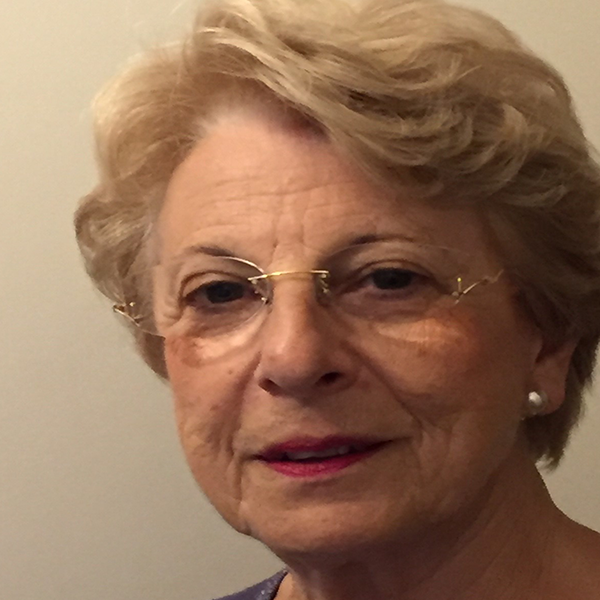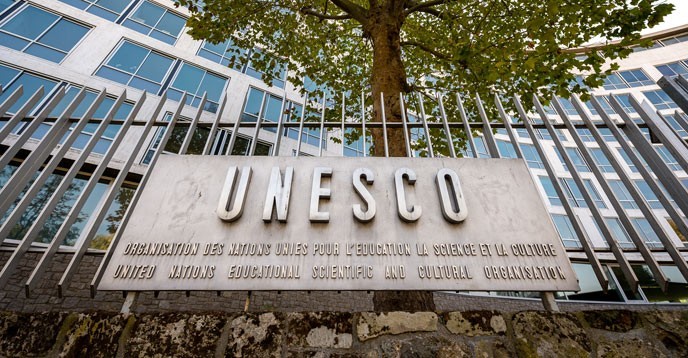This edition introduces SI’s advocacy efforts at the United Nations Educational, Scientific, and Cultural Organisation (UNESCO).
The United Nations (UN) Agency in Paris is the home of UNESCO, where Soroptimist International has three UN representatives, Marie-Christine Gries, Evelyne Para, and Rina Dupriet, whose work and expertise covers the role of education, science, and culture in achieving gender equality.
“Contribute to the building of a culture of peace, the eradication of poverty, sustainable development and intercultural dialogue through education, the sciences, culture, communication and information.” – UNESCO’s Mission Statement
UNESCO follows a medium-term strategy that sets out the vision and programmatic framework for UNESCO’s action over an eight-year term. The current term has been operating since 2014 and will end in December this year. This term’s global priorities are Africa and Gender Equality. (Follow the links for more information on how UNESCO is engaging with these themes: UNESCO Operational Strategy for Priority Africa and UNESCO Priority Gender Equality Action Plan).

SI UN Representative, Rina Dupriet
UNESCO confers with non-governmental organisations (NGOs) through bilateral relationships with individual NGOs and also through a collective partnership with the International Conference of NGOs and its executive, the NGO Liaison Committee. This Committee is made up of eleven elected representatives from a variety of NGOs that hold an official partnerships with UNESCO. The role of the NGO Liaison Committee is to represent the interests of all NGOs and define a strategy for their collective cooperation which is grounded in the recommendations adopted by the International Conference of NGOs (ICNGO).
For the past four years, SI UN Representative, Marie-Christine Gries, has served on the NGO Liaison Committee. Marie-Christine describes what it is like to serve as a member of this Committee:
“To sit on behalf of your elected organisation is an honour and a challenge for everyone: to make even more use of the expertise and values of your NGO, to implement them and to integrate it’s goals in it’s contribution to the work of the Committee, in particular in the organisation of forums and collective thematic works of reflection. The mission entrusted by the NGO partner community reflects a variety of interests and each member of the Committee takes part in work in such diverse programme areas. One must also, as a member of any committee or executive board, take charge of material management tasks; for my part, this was the Treasury, for two terms (each NGO can be re-elected for a second consecutive term). The members of the Committee work directly with UNESCO experts, and the Secretariat of the General Director, whose body is dedicated to partners: the Unit for Partnership with Civil Society”.
After each biennium, a new Liaison Committee is elected. This process is finalised during the International Conference of NGOs. The official role of the International Conference of NGOs (ICNGO) is to “review the state of cooperation with UNESCO […] and facilitate cooperation between organisations having common interests.”*
Due to the COVID-19 pandemic, the most recent ICNGO was held virtually, during December 2020. The conclusions of this meeting covered issues relating to the impact of technology and distance learning on access to education, the increasing importance of the concept of global citizenship, emphasis on increasing UNESCO’s partnership with NGOs, and new budgeting goals to ensure that the poorest are not left behind. You can read the full conclusion paper HERE.
Throughout each year, the NGO Liaison Committee together with UNESCO organise two NGO forums covering a diverse range of themes in UNESCO’s area. For this reason, SI’s UN Representatives often adapt their work to engage with new themes and priorities.
Marie-Christine describes what it is like to be involved with the organisation of a successful forum:

SI UN Representative, Marie-Christine Gries
“The preparation and implementation of the forums is a difficult task, regardless of the themes and the place: it is necessary to obtain a consensus between the stakeholders (NGOs, UNESCO, host country) on the topics covered in the theme chosen by the NGOs, bring together speakers, establish a program… and obviously settle the material issues. The Committee obviously relies on the good will of the official representatives of NGOs (in Paris as well as in their respective countries). Their collective reflection is the foundation of the programme of the forum.
A forum should be useful, closed with recommendations from NGOs, and it is desirable that it be followed by programmes to implement those recommendations. An excellent example is that of the Yamoussoukro Forum in 2014 ‘Water for All in Africa’, which spawned a working group of NGOs that has since organised training sessions for water technicians for francophone African countries. Despite the complexity, what an exciting adventure! And the bonus in this case, our Ivorian Soroptimist clubs actively participated in the forum, showing the dynamism of Soroptimist International, a great pride for me!”

SI UN Representative, Evelyne Para
Evelyne Para and Marie-Christine describe how COVID-19 has affected NGO engagement at UNESCO:
“Throughout 2020 and until this day, it has been, and it is still, very difficult to meet “normally” at UNESCO because of the health crisis. All discussions and work take place by video conference, as is everywhere in the world” – Evelyne.
“We entered a very difficult period and, as everywhere, the projects were postponed and upset. The UNESCO NGOs community hopes that this year 2021 will allow a return to work, taking into account the impact of this pandemic on the issues that had to be addressed in the thematic reflections as in the preparation of the forums and other events. The new liaison Committee has just been set up and has not yet announced its work plan. However, it is normal for projects already well advanced to be relaunched. The Global Citizenship Forum was expected to provide much-anticipated insights and inputs on NGO action for the high-level conference to be held in South Korea in July 2021. The work will probably resume very soon and the contributions of NGOs, experiencing this crisis on the ground will be even more significant for the development of strategies for the promotion of Global Citizenship. Together with the work of the Working Group on the Status of Girls, and the impact of the Commission on the Status of Women on UNESCO’s programmes, this forum is one of my priorities for 2021.”

UNESCO and World Economic Forum Present ‘Girl Trouble: Breaking Through the Bias in A.I.’ Click the image for more information.
SI’s UN representatives at UNESCO have worked tirelessly throughout the course of this tumultuous year to ensure that the rights of women and girls are protected and incorporated into international programmes and policies. Evelyne Para provides three examples of work that she is currently participating in:
- On International Women’s Day (March 8), UNESCO and the World Economic Forum presented ‘Girl Trouble: Breaking Through The Bias in AI‘. This timely round-table brought together a range of leading female voices in tech to confront the deep-rooted gender imbalances skewing the development of artificial intelligence. The panelists were female change-makers in AI. From C-suite professionals taking decisions that affect us all, to women innovating new AI tools and policies to help vulnerable groups, to those courageously exposing injustice and algorithmic biases. Check out the SI blog page to read Evelyne’s ‘Artificial Intelligence: a regression for gender equality?’ blog from this event.
- The UNESCO Working Group “The Futures of Education – Learning to Become ” held the second Youth Webinar focusing on “Technology and the futures of education” on Thursday, 11 March. Organised in collaboration with the Office of the Secretary-General’s Envoy on Youth. With COVID-19 disruptions to education and shifts to distance learning, the topic of technology and education in the future is both embraced and contested. Voices of youth on this topic have not been heard enough, and we believe this discussion to be timely.
- In spring 2020, at the outset of the COVID pandemic and faced with the looming human catastrophe, on an ad hoc basis and in complete transparency a group of partner NGOs decided to pool information from the field and support their local associations by creating the UNESCO Working Group: “A solidarity project of NGO UNESCO partners to fight the pandemic”. This project gave rise to a report which highlights the tremendous outpouring of global solidarity from civil society and opens avenues to define future post-COVID priorities. The report was well received by the Director-General and by her services.
Click HERE for more news and blogs from the team in Paris.

